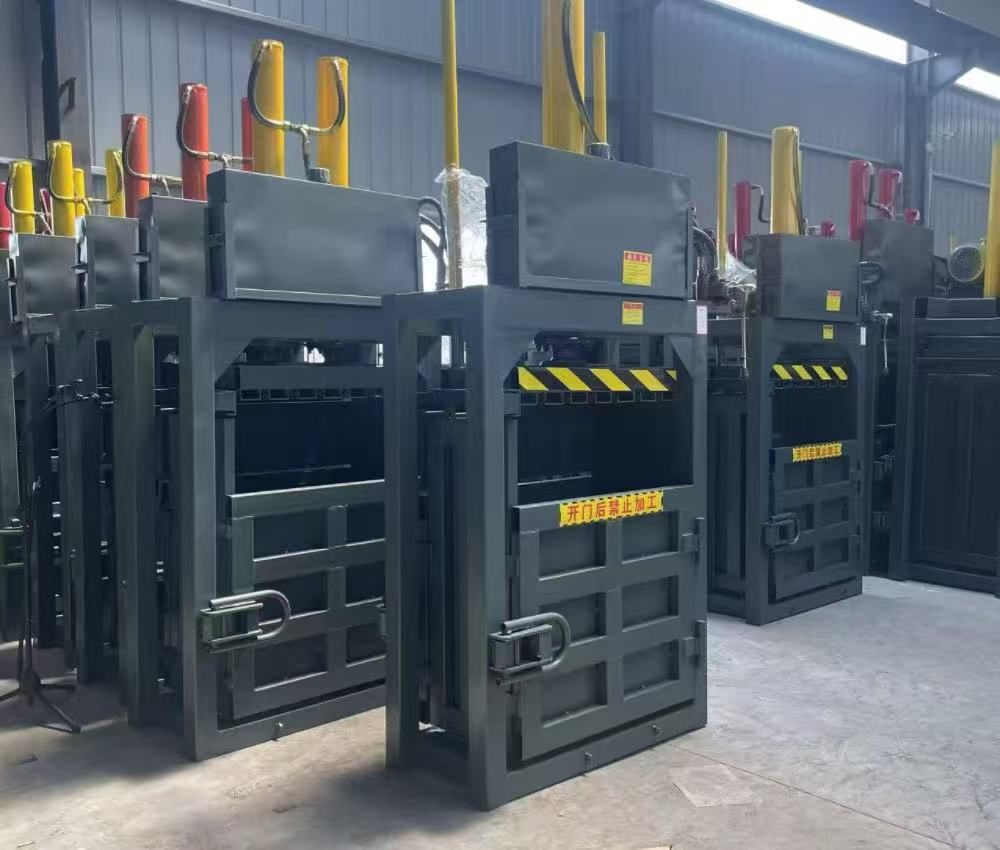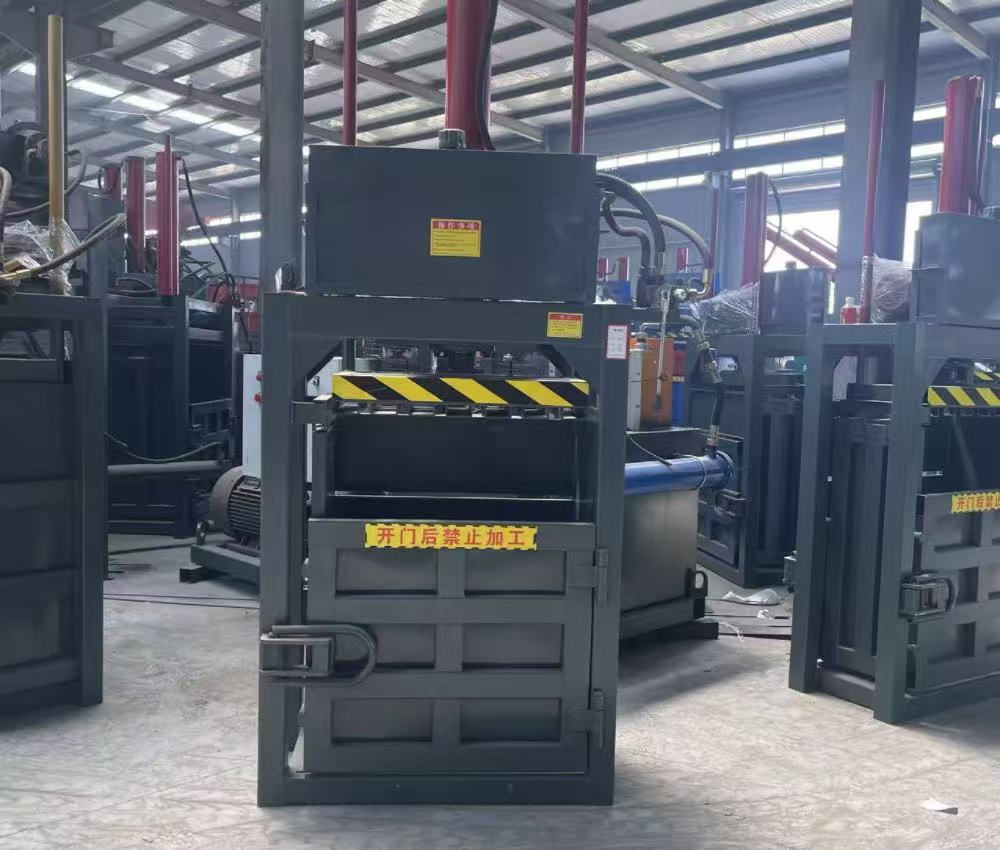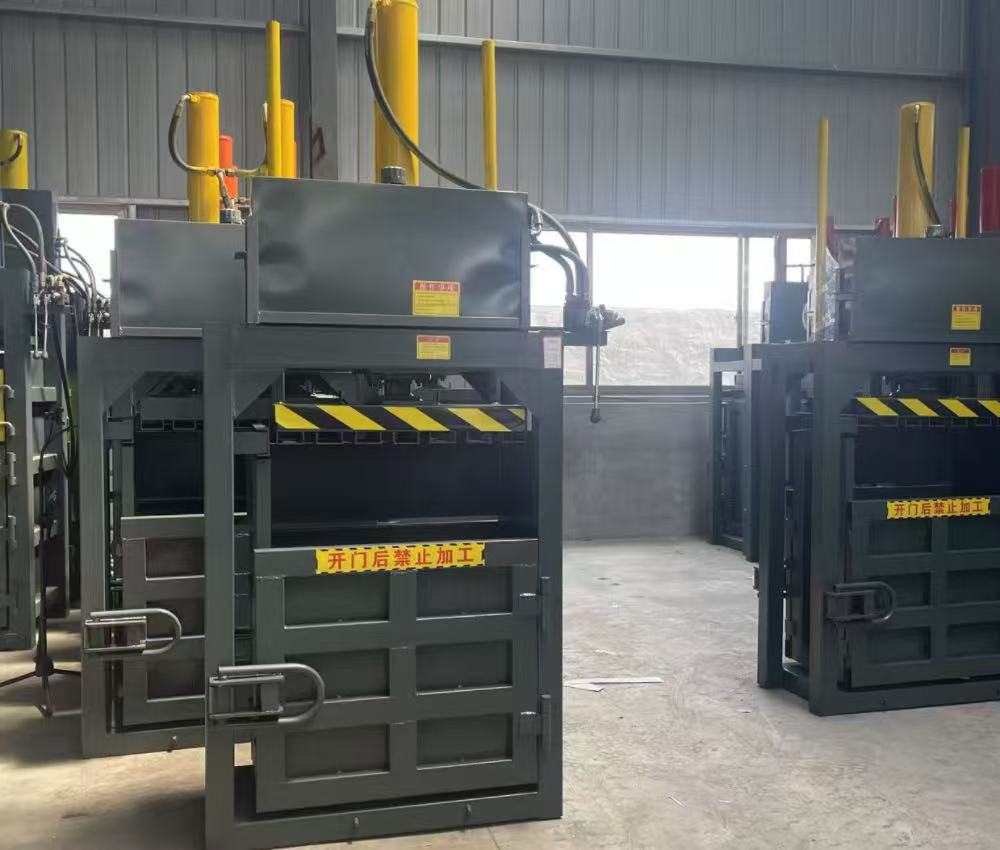What Is A Vertical Baler?

A vertical baler is a recycling machine that compresses loose waste materials into dense, uniform bales. It gets its name from the way it works—the hydraulic press moves vertically from the top downward, applying high pressure to reduce the size of bulky recyclables.
Vertical balers are designed for handling lightweight but bulky materials, such as:
-
Cardboard: Corrugated boxes, cartons, and packaging.
-
Plastic: Shrink wrap, bottles, and film.
-
Clothes and Textiles: Used garments, fabric scraps, and second-hand clothing.
The finished bales are tied securely and ejected from the chamber, making them easy to transport, stack, and recycle. Unlike horizontal balers that require large floor space and higher investment, vertical balers are compact, cost-effective, and ideal for small to medium businesses.
Vertical balers are widely used in retail stores, warehouses, supermarkets, recycling centers, and garment factories, making them one of the most versatile tools in modern waste management.
Why Use A Vertical Baler?

1. Save Valuable Space
Loose waste is inefficient to store. A warehouse filled with uncompressed cardboard or textiles can quickly become unmanageable. By compressing these materials into bales, businesses reduce waste volume by up to 90%. That means more available space for productive activities.
2. Reduce Waste Handling Costs
Transportation is one of the biggest expenses in waste management. A vertical baler significantly reduces the number of trips required to transport waste. Moreover, baled recyclables are often purchased at higher rates by recycling companies, turning waste into an additional revenue stream.
3. Cleaner And Safer Work Environment
Workspaces cluttered with loose waste not only look messy but also increase fire risks and workplace hazards. A baler organizes recyclables into compact, stackable blocks, making facilities safer and more professional.
4. Support Sustainability Goals
In today’s business environment, sustainability is not optional—it is expected. Customers, partners, and regulators all value eco-friendly practices. A vertical baler encourages recycling, reduces landfill use, and helps businesses lower their carbon footprint.
5. Easy To Learn And Operate
Modern vertical balers are designed with simple control panels and safety systems. Workers can learn to operate the machine with minimal training. With automatic bale ejection available in advanced models, manual effort is reduced to the bare minimum.
6. Adaptable To Different Industries
Whether it is a clothing recycling company, a logistics warehouse, or a supermarket, vertical balers adapt to different needs. Some models can even be customized with adjustable bale sizes and extra features to handle specific materials.
How Does A Vertical Baler Work?

The process of operating a vertical baler is straightforward:
-
Loading The Material
The operator opens the front door and places waste inside the chamber. This can include cardboard boxes, used clothes, or plastic packaging. -
Compression
Once the chamber is full, the door is closed, and the hydraulic platen pushes downward with high force. The pressure significantly reduces the volume of the waste. -
Securing The Bale
After compression, the material is tied using strapping or steel wire. Depending on the machine, this may be done manually, semi-automatically, or fully automatically. -
Bale Ejection
The bale is then ejected from the chamber. Automatic ejection systems save time and reduce the need for manual labor.
The whole process takes just a few minutes, producing compact bales that are easy to move with forklifts or pallet jacks.
Extended Benefits Of Vertical Balers
Improved Recycling Efficiency
By producing uniform bales, vertical balers make it easier for recycling centers to process materials. Instead of dealing with irregular waste, recyclers receive neatly packed bales that can go directly into their recycling systems.
Compliance With Regulations
Many countries and regions have strict waste management laws. Businesses that fail to recycle properly may face fines. Installing a vertical baler ensures compliance and demonstrates a proactive approach to environmental responsibility.
Better Workplace Productivity
Employees spend less time dealing with waste when using a baler. Instead of making multiple trips to dispose of loose waste, workers can focus on core operations while the baler handles compaction.
Industry Applications Of Vertical Balers
1. Retail And Supermarkets
Large volumes of cardboard and plastic wrap are generated daily. A vertical baler turns this waste into compact bales, making stores cleaner and more efficient.
2. Clothing And Textile Recycling
The global demand for second-hand clothes is growing. Vertical balers help textile recyclers compress garments into bales that are easy to export.
3. Warehouses And Logistics
Distribution centers generate packaging waste with every shipment. Balers reduce clutter, save space, and streamline recycling operations.
4. Recycling Facilities
Recycling centers use vertical balers as entry-level machines to handle moderate volumes of waste. They are especially useful in regions where large-scale horizontal systems are not yet economical.
Why Choose Aultral Machinery Vertical Balers?
At Aultral Machinery, we design and manufacture vertical balers that combine power, durability, and user-friendly operation. Our machines are built with:
-
Strong Hydraulic Systems for consistent compression power.
-
Automatic Bale Ejection to save time and effort.
-
Safety Features such as emergency stops and interlocks.
-
Customizable Options for bale size, strapping method, and chamber design.
-
Durable Materials to ensure a long working life with minimal maintenance.
With over 10 years of experience in recycling equipment, Aultral Machinery provides solutions trusted by businesses worldwide. We understand that every industry has unique needs, so we offer tailored recommendations to maximize efficiency and reduce costs.
Future Of Vertical Balers In Recycling
As global awareness of environmental sustainability increases, the role of balers will continue to grow. More businesses are expected to adopt baling technology to reduce waste, comply with regulations, and strengthen their eco-friendly image.
Vertical balers, in particular, are set to remain the preferred choice for small to medium businesses due to their affordability, compact footprint, and versatility. With improvements in automation and safety, future models will become even more efficient and user-friendly.
Conclusion
A vertical baler is more than just a machine—it is a smart investment in efficiency, safety, and sustainability. By compressing clothes, cardboard, and plastic into compact bales, businesses save space, reduce costs, and simplify recycling.
Whether you are a retailer, recycler, or warehouse operator, a vertical baler offers a practical solution to modern waste management challenges. Choosing a high-quality machine ensures long-term benefits for both your business and the environment.
